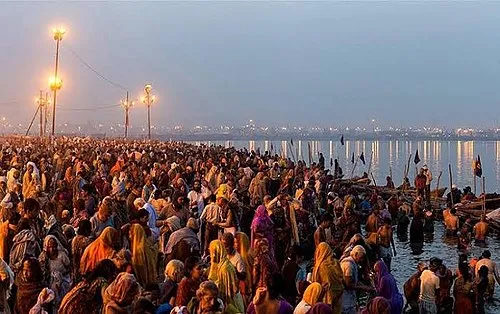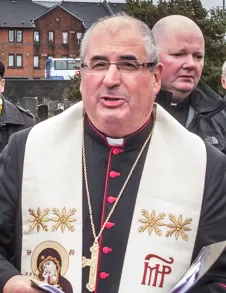In 2021, outgoing U.S. President Donald Trump faced impeachment for the second time, charged with incitement of insurrection due to the January 6 attack on the United States Capitol just one week earlier. This historic event marked a significant moment in American political history.
On January 13
16
Important Days
56
Important Events
326
Births and Deaths
recorded.
Holidays and Occasions
Events
Births and Deaths

Constitution Day in Mongolia: A Celebration of Democracy and Rights
Constitution Day, or Худалдааны өдөр (Khudaldaany Ödör), is a significant national holiday celebrated in Mongolia on January 13th each year. This day commemorates the adoption of the country's first constitution in 1924, marking a pivotal moment in Mongolia's journey towards democracy and social reform...

Democracy Day in Cape Verde: Honoring Democratic Values and Progress
Democracy Day in Cape Verde, celebrated annually on September 24th, stands as a significant marker of the country's journey towards democratic governance. This day commemorates the first free elections that took place in 1991, marking the beginning of a political transformation in the archipelago nation...

Liberation Day in Togo: Commemorating the Journey to Independence
Togo, a small yet vibrant nation in West Africa, commemorates its Liberation Day on August 26th each year. This significant event marks the end of a long struggle for independence and self-determination...

Old New Year's Eve: Traditions and Celebrations in Eastern Europe
Old New Year's Eve is a unique cultural tradition celebrated in various countries, particularly in Russia, Belarus, Ukraine, Serbia, Montenegro, the Republic of Srpska, and North Macedonia. This holiday is observed on the night of January 13th, according to the Julian calendar, aligning with the Gregorian calendar date of January 1st...

Celebrating Malanka: The New Year’s Tradition of Ukraine, Russia, and Belarus
Malanka, a lively celebration marking the New Year and the Feast of St. Vasily, is an enduring tradition in Ukraine, Russia, and Belarus...

Sidereal Winter Solstice's Eve Celebrations in South and Southeast Asia
The sidereal winter solstice's eve is a captivating event marking the culmination of the six-month Dakshinayana period, often celebrated on January 14. This time of year holds immense significance in various cultures across South and Southeast Asia, embodying rich traditions, rituals, and an array of festivities that reflect the region's diverse heritage...

Bhogi Festival: A Cultural Celebration in Andhra Pradesh and Tamil Nadu
Bhogi, a vibrant festival celebrated primarily in the southern Indian states of Andhra Pradesh and Tamil Nadu, marks the onset of the harvest season and is an integral part of the Pongal celebrations. It falls on the last day of the month of Margazhi and typically occurs in mid-January...

Lohri: Celebrating the Harvest Festival of Punjab, Haryana, and Himachal Pradesh
Lohri is a vibrant and joyous festival celebrated primarily in the northern Indian states of Punjab, Haryana, and Himachal Pradesh. It marks the end of winter and the onset of longer days, as well as being a harvest festival, particularly for farmers...

Uruka: A Glimpse into Assam's Vibrant Festival
Uruka, a vital part of the Bihu festival, is one of the most cherished celebrations in Assam, marking the advent of the Assamese New Year. This vibrant occasion offers a glimpse into the rich cultural tapestry of Assam, showcasing its traditions and values...

Stephen Foster Memorial Day: Honoring America's Musical Legacy
Stephen Foster Memorial Day, observed annually on January 13th, honors the legacy of Stephen Collins Foster, an iconic figure in American music history. Often referred to as the "father of American music," Foster's compositions have left an indelible mark on the American cultural landscape...

Discovering Yennayer: The Berber New Year Celebration
Yennayer, the Berber New Year, falls on January 12th and marks the beginning of the Amazigh calendar. This celebration is deeply rooted in the rich history and culture of the Berber people, also known as Amazigh, who inhabit various regions across North Africa, primarily in Morocco, Algeria, Tunisia, and Libya...

Blessed Veronica of Milan: Life, Legacy, and Spiritual Insights
Blessed Veronica of Milan, also known as Veronica Giuliani, remains a significant figure in the history of the Catholic Church. Her life exemplifies unwavering faith, service, and devotion to God...

Elian: Historical Significance and Cultural Impact
Elian is a name that resonates with diverse cultural backgrounds and profound historical significance. Whether referring to the popular name, an emblematic figure in political debates, or a representation of migration issues, Elian carries multiple connotations...

Hilary of Poitiers: Defender of the Faith Against Arianism
Hilary of Poitiers (c. 300–368 AD), also known as the "Athanasius of the West," was a significant figure in early Christianity...

Understanding Mungo: The Versatile Fabric of the Future
Mungo, a fabric that has rich historical roots and versatile applications, is becoming increasingly popular in today’s textile market. Known for its durability and eco-friendliness, Mungo fabric is made from the wool of the Mungo sheep, particularly prevalent in certain regions of Australia and New Zealand...

Celebrate St. Knut's Day: The Final Cheers of Christmas in Sweden and Finland
St. Knut's Day, also known as Tjugondag Knut, marks the end of the Christmas festivities in Sweden and Finland...

























